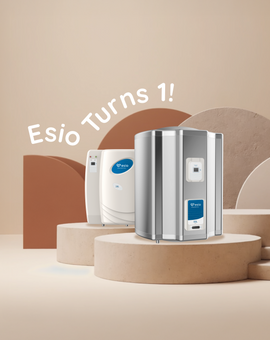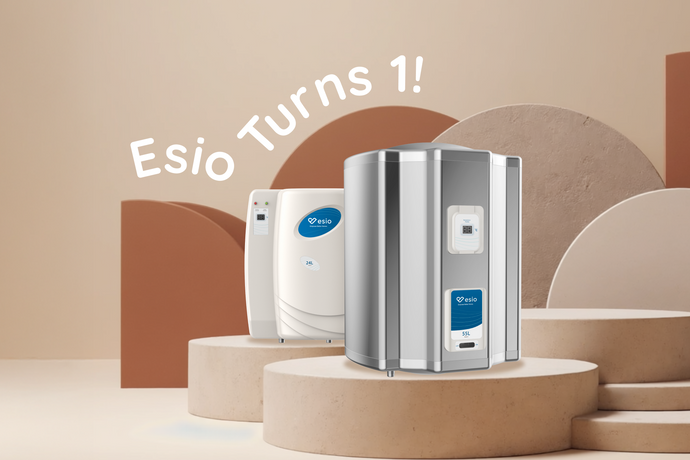Introduction
Choosing the right water heater for your daily hot showers is like finding the perfect puzzle piece for your home – it's about ensuring that it fits seamlessly into your lifestyle and meets your unique needs.
Imagine stepping into a shower on a rainy day, expecting a comfortable hot shower but encountering icy cold water. Frustrating, right? That’s why choosing the right water heater is more than just picking an appliance, but it’s about ensuring a comfy and safe shower time. Picking a wrong water heater can lead to hot water troubles, high electricity bills, and potential safety concerns.

In Malaysia, most households use instant water heaters as their daily hot water solution. However there are alternatives that might better suit your needs. In this guide, we will dive into the importance of making decisions when it comes to your water heating needs.
We’ll cover:
- Understanding Your Needs
- 3 Common Types of Water Heaters in Malaysia
- 7 Key Features to Consider
- Water Temperature
- Water Temperature Consistency
- Water Pressure
- Heating Time
- Operating Noise
- Safety Features
- Energy Saving
- Capacity and Size
- Budget Considerations
- Installation
- Brand Reputation
- Conclusion
Understanding Your Needs
Before diving into the common factors or features of water heaters, it’s crucial to understand your household’s hot water demands, tailoring your selection to match your lifestyle.
Accessing Household Hot Water Requirements
Begin by considering the number of family members, their daily routines, and the simultaneous hot water demands. Take into account factors such as bathing methods (showering or bathing) and the number of bathrooms in your house. A precise assessment of your household’s hot water needs forms the foundation for selecting a water heater that caters to your requirements.

Photo by Nathan Dumlao onUnsplash
Determining Frequency and Patterns of Hot Water Usage
Delve deeper into understanding the frequency and patterns of hot water usage in your household. For example, does the demand peak in the morning during showers, in the evening for dishwashing, or at various times throughout the day?
Explore the various activities in your household that involve hot water. This includes not only hot showers but also tasks like dishwashing, laundry, and general cleaning. Different activities may have varying temperature requirements, influencing the type and capacity of the water heater needed.
Consider Space Constraints
Whether you live in a spacious house or a cosy condominium, assessing available space for installation is crucial. Some water heaters may be compact and fit snugly into tight spots, while others might require more room. Understanding spatial limitations helps narrow down the options and ensures a smooth integration into your home.
3 Common Types of Water Heater In Malaysia
Malaysia, with its diverse climate and unique consumer needs, offers various types of water heaters. Let’s explore the 3 common types of water heaters: instant water heaters, storage water heaters, and solar water heaters.
1. Instant Water Heaters
Instant water heaters are the sprinters of the water heating world, delivering warm water on demand. Their compact size and energy efficiency make them a popular choice in Malaysia. The pros and cons of instant water heaters are:
Pros and Cons
|
Pros |
Cons |
|
|
Suitable Scenarios
Instant water heaters are ideal for individuals or small families with modest warm water needs. They are perfect for showering, providing a basic and instant warm water supply, making them ideal for those with minimal warm water usage demands. They are the go-to choice for those with straightforward warm water requirements.
2. Storage Water Heaters
Storage water heaters, on the other hand, take a different approach by preheating water and storing water within a tank for later use. This type of water heater offers a steady supply of hot water for longer durations, addressing some of the shortcomings of instant heaters.
Advantages and disadvantages
|
Advantages |
Disadvantages |
|
|
In Malaysia, newly launched properties trend towards providing both hot and cold water inlets, promoting the installation of storage water heaters for enhanced daily hot showering or bathing comfort. This reflects a growing awareness of the need for efficient water heating solutions, catering to modern homeowners seeking increased comfort and premium experiences.

Photo by Parker Coffman on Unsplash
Storage water heaters are crafted to enhance daily experiences, addressing the needs of contemporary homeowners seeking increased comfort and premium living. They ensure a steady and uninterrupted supply of hot water, making them the preferred choice for those who value a premium and indulgent bathing experience. Esio addresses these needs with patented technology, advanced insulation, and a compact design, offering a revolutionary solution that blends practicality with innovation.
3. Solar Water Heaters
Overview
In the pursuit of sustainable living, solar water heaters have gained popularity. Harnessing energy from the sun, these heaters provide an eco-friendly alternative to conventional options.
Applicability in the Malaysian context
While solar water heaters align with the green agenda, their applicability in the Malaysian context may raise concerns, especially during rainy days when sunlight is limited. Understanding the limitations and considering backup solutions becomes essential for a seamless experience.
7 Key Features to Consider
Selecting the right water heater involves more than just picking a brand or type. To ensure a seamless and comfortable experience, it’s crucial to delve into the key features that define the performance and safety of these appliances.
1. Water Temperature
While instant water heaters can supply warm water within a range of 36 to 38°C, storage water heaters and solar water heaters are capable of providing hot water temperatures ranging from 36 to 45°C. This substantial temperature difference significantly influences the hot showering experience and bathing activities, such as soaking in the bathtub and enjoying a comfy hot shower, especially during the rainy season.

Photo by Ginger Hendee on Unsplash
2. Water Temperature Consistency
Picture this scenario: a perfect, hot shower suddenly turning icy or scalding. To avoid such discomfort, prioritise water heaters with temperature consistency features. Models equipped with advanced thermostatic controls, such as Storage Water Heaters, ensure a reliable and steady water temperature.
Instant Water Heaters provide immediate warm water with potential fluctuations, influenced by flow rate and simultaneous usage. Solar Water Heaters, dependent on sunlight, offer consistent temperatures but may vary on cloudy days, often using supplementary heating systems that could lead to higher electricity bills.
3. Water Pressure
The enjoyment of a hot shower is significantly influenced by water pressure. When choosing a water heater, it's crucial to consider the unit's water pressure capabilities.
While instant water heaters may face challenges in maintaining consistent pressure, especially in low-pressure households, both storage water heaters and solar water heaters ensure reliable water pressure, offering a premium hot showering experience akin to that of a 5-star hotel.

Photo by Photoholgic on Unsplash
4. Heating Time
Instant water heaters provide immediate warm water with minimal to no waiting time. On the other hand, storage water heaters incorporate pre-heated tanks to ensure an uninterrupted supply, and the significance of heating time diminished when selecting a suitable capacity. Moreover, heating time can be significantly reduced by the heating specifications. Even with the same capacity of water heaters, higher heating specifications can result in even faster heating times.
Solar water heaters rely on sunlight for heating, and the initial heating times are influenced by sunlight availability. Similarly, the significance of supplementary heating options is less critical when selecting a suitable capacity.
5. Operating Noise
Consider the operating noise of water heaters, especially if installed near living spaces, to maintain a serene home environment. Instant water heaters may produce operational noise, particularly when installed on the bathroom wall, especially with a pump for increased water pressure.
Storage water heaters operate quietly, as they maintain a constant water temperature in the pre-heated tank. The absence of frequent heating cycles reduces operational noise. Solar water heaters, usually installed on the rooftop, operate silently, relying on natural sunlight for heating.

Photo by Taylor Beach on Unsplash
6. Safety Features
Safety should always be a top priority when selecting a water heater. Look for features such as ELCB (Earth Leakage Circuit Breaker) which provides protection against electric shock by cutting off power in the event of a current leakage. Another crucial safety feature is thermostat controls, it allows you to set and control the water temperature, preventing scalding accidents.
Before making your decision, ensure to check for SIRIM safety certifications. This certification guarantees that the water heater complies with Malaysia’s regulatory standards for a product that meets stringent quality and safety guidelines.
SIRIM has introduced new SIRIM-ST labels with QR code for all regulated electrical and gas products under the Energy Commission (Suruhanjaya Tenaga or ST). With this new label, consumers can check the water heater safety certificate by scanning the QR code, ensuring the authenticity status of the appliance.
7. Energy Saving
In a world increasingly conscious of energy consumption, choosing a water heater with energy-saving capabilities is particularly important. Look for high energy efficiency models or specific technologies designed to minimise electricity consumption. This not only contributes to a greener planet but also keeps your utility bills in check.
Summary of Water Heater Key Features
|
Features |
Instant Water Heater |
Storage Water Heater |
Solar Water Heater |
|
Water Temperature |
36 - 38°C |
36 - 45°C |
36 - 45°C |
|
Water Temperature Consistency |
Low |
Strong |
Strong |
|
Water Pressure |
Low |
Strong |
Strong |
|
Heating Time |
Immediate |
Faster with higher heating specifications |
Depending on sunlight availability |
|
Operating Noise |
Yes |
No |
No |
|
Safety Features |
Choose brands or models equipped with ELCB or SIRIM certified labels |
||
|
Energy Saving |
High energy efficient models are available |
||
Capacity and Size
Instant water heaters are generally designed for one-to-one use, making them ideal for individual needs. It's compact and typically installed at individual points, instant water heaters are unable to support multiple bathrooms and pairing with bathtubs. There are no specific capacity specifications, as they provide instant heat-up for on-demand hot water.
Storage water heaters offer versatility for both single-point and multiple-point use, providing flexibility in their applications. With various capacities available, typically ranging from 30L to 100L, the choice of size depends on the number of users and their usage behaviour. This flexibility allows you to pick a suitable size tailored to different household needs.
Solar water heaters are geared towards supplying hot water to multiple points in your house, by harnessing solar energy for heating. Typically with a capacity ranging from 150L to 300L, these systems can meet diverse household needs, depending on user requirements and solar energy availability.

Photo by R ARCHITECTURE on Unsplash
Budget Considerations
Initial Costs
When considering a water heater purchase, the upfront expenses are typically the first aspect that comes to mind. The instant water heater stands out with its lowest unit price and installation fee. However, if installation is required for multiple bathrooms, the cumulative costs can become significant.
Meanwhile, the storage water heater positions itself in terms of unit price, falling between instant and solar water heaters. This option necessitates hot and cold water inlet piping, a feature increasingly prevalent in new properties across Malaysia.
On the other hand, the solar water heater commands the highest unit price and installation costs, mainly due to the rooftop placement required. It's essential to factor in these additional expenses.
Operating Costs
For instant water heaters, operating costs are generally lower, providing on-demand hot water and minimising standby energy losses.
Storage water heaters fall between instant and solar water heaters in terms of operating costs. Many brands now offer energy-saving models, potentially reducing these costs. Theoretical savings are possible, making it a more economical choice over time.
Solar water heaters, in theory, have the lowest operating costs due to their reliance on solar energy. However, they become ineffective when there's no sun. Consequently, during rainy seasons, the solar water heater resorts to using its electric heating element to warm the water in the tank. Given that the typical capacity of solar water heaters ranges from 100 to 300L, electricity costs can soar.
Assessing Long-Term Value
Determining the value of a water heater involves looking beyond initial and operating costs to assess long-term benefits. While an instant water heater may seem attractive for monthly bill savings, its shorter lifespan of 2-3 years results in more frequent replacements and provides no long-term value.
In contrast, a well-maintained storage water heater with premium features not only enhances your daily hot shower or bathing experience but also lasts for over 10 years, offering reliability and enduring value.
Solar water heaters, despite their higher upfront investment, promise long-term savings through reliance on solar energy. However, the overall value may be influenced by supplementary heating costs during less sunny periods. Additionally, maintenance costs for solar water heaters can be relatively high, including expenses for maintaining solar panels, cleaning dirt from the collectors, and repairing broken glass or leaks.

Photo by Marian Florinel Condruz on Unsplash
Installation
Water heaters are complex appliances that involve electricity and water. Professional installation of water heaters is crucial for safety, minimising the risk of accidents like leaks or electrical malfunctions.
A certified technician ensures correct setup, creating a safe environment. Quality installation contributes to the efficiency and longevity of your water heater, promoting optimal performance, consistent hot water, and reducing breakdowns.
Brand Reputation
Look for brands with industry awards or certifications, signalling a commitment to quality. Established brands often have a track record of reliability, while newer ones may offer innovation. Prioritise brands with strong customer support for troubleshooting and maintenance guidance. Consider the duration and coverage of warranties, as they reflect the brand’s confidence in its products.
Conclusion
|
Aspect |
Instant Water Heater |
Storage Water Heater |
Solar Water Heater |
|
Hot Water Supply |
Immediate hot water Single Point |
Continuous supply Single or Multiple Point |
Depends on sunlight availability |
|
Pairing with Rain Shower |
Low Pressure |
O |
O |
|
Pairing with Bathtub |
X |
O |
O |
|
Capacity Range |
N/A |
30L to 100L |
150L to 300L |
|
Installation |
Easy and compact |
Requires hot and cold water piping |
Rooftop installation Requires hot and cold water piping |
|
Initial Costs |
Lower |
Mid-range unit price |
Higher |
|
Operating Costs |
Lower |
In between instant and solar, energy-saving options are available. |
Lower (but might be the highest during rainy season) |
|
Lifespan |
Usually 2-3 years |
Last for over 10 years with proper maintenance |
Up to 20 years, influenced by maintenance and weather |
|
Usage Scenario |
Individual use, small spaces |
Small to large households |
Suitable for larger household sizes |
In summary, choosing the right water heater involves weighing various factors, with each type having unique features and considerations. Instant water heaters offer quick solutions but come with a shorter lifespan. Solar water heaters are sustainable but face challenges in less sunny periods.
The growing trend in Malaysia favours storage water heaters for their versatility, continuous hot water supply, and varied capacities, making them suitable for households of all sizes. As the demand for efficiency and enhanced bathing experiences increases, storage water heaters emerge as a popular choice, addressing diverse needs and reflecting a shift towards practicality and comfort in daily living.


